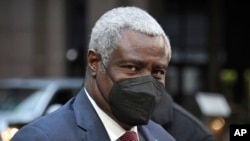Russia has played an increasing role on the African continent through trade, aid, military training and paramilitary security. Analysts say the future of that relationship will be tested as Russia’s tensions with the West escalate amid the Ukrainian conflict.
The South African government condemned Russia’s action in a statement, saying “it is dismayed at the escalation of the conflict in Ukraine” and “calls on Russia to immediately withdraw its forces from Ukraine in line with the United Nations charter.”
Other African countries remained quiet Thursday as Russian forces pushed into Ukraine.
Russia has increased its presence on the continent in recent years and is scheduled to host a Russia-Africa summit this November.
Regardless of how African nations react to Russia’s invasion going forward, analysts say the continent will feel repercussions.
Irina Filatova is the professor at Russia’s Higher School of Economics University.
"Will it be the new cold war, or will it be the new hot war? We still do not know. But whatever it is, Africa is one, is going to be one of the victims of it,” Filatova said.
Countries reliant on imported oil and gas like South Africa will feel the pain of skyrocketing prices.
Northern African countries that import grains from Ukraine will feel disruptions in supply and price.
The conflict could also impact the availability of funding and resources for international development and aid that many African countries rely on.
Dzvinka Kachur is a researcher at the Centre for Sustainability Transitions at South Africa’s Stellenbosch University.
"It's also going to create a long-term distraction from and attention from the sustainable development goals,” Kachur said. "So we can expect the budgets of states around the world will be gearing towards more militarization and not the developmental goals.”
The conflict not only risks disruptions to aid, but also military and peacekeeping support on the continent.
Pauline Bax is the deputy director for the International Crisis Group in Johannesburg.
“A lot of attention will be taken away from conflicts that are quite urgent here in Africa, such again as the Sahel, the conflict in Mozambique and the conflict in Ethiopia," said Bax. "A lot of diplomatic efforts will have to be put in the Ukraine crisis now and has already been put in – to the detriment of other crises here in Africa.”
However, the conflict could also bring opportunities.
Kachur says African leaders should call for changes in global power structures, especially at the United Nations.
Russia is of of five permanent members of the U.N. Security Council.
“This is an opportunity to show that U.N. system is ineffective if the aggressor is one of the permanent members of the U.N. Security Council,” Kachur said. ".... This is a good time for African countries to talk about the change of the global system of international relations and to redistribute power.”
Analysts note it’s too early to be sure how the conflict in Ukraine will affect countries thousands of kilometers away. But to the extent the world order is being altered, Africa will feel the impact.





